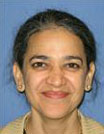
Ranjana Kumar
GAVI Senior Programme Manager for South and South East Asia

Less than a decade ago Bihar’s immunisation rate was just 18%, but through innovative methods, it has found ways to reach the hardest to reach children, such as those of migrant families working the brick kilns such as these. Today Bihar’s routine immunisation coverage is higher than 85%.
Credit: GAVI/2013/Duncan Graham Rowe.
As a paediatrician, I have encountered at close quarters the dread and panic in parents and children afflicted by polio. I have worked in rehabilitation centres, where I witnessed the despair and pain of those afflicted and their near-ones as the reality of long-term disability sinks in.
During the years I spent working in the slums of Delhi with civil society organisations, I also participated in the pulse polio campaign at the community level when it was still at a nascent stage. It was only later, when managing this programme on behalf of donors and working closely with ministries, United Nations agencies, Rotary and other partners that I realised how much the remarkable journey to banish polio from this region has become very much part of my own journey in public health. I am blessed to have witnessed and personally participated in such a momentous and historical journey.
Therefore, it gives me great pleasure on behalf of the GAVI Alliance to participate in the 7th Meeting of the South-East Asia Regional Certification Commission for Polio Eradication (SEA-RCCPE). This is an historical milestone in public health in the South East-Asia region as it is certified polio-free.
The GAVI Alliance applauds the strong leadership from governments, the seamless partnership between implementing countries, civil society, donors and technical agencies combined with the dedication and hard work of millions of front-line workers. We salute this tremendous partnership and all the players within the scientific and public health community for their dedicated work in developing technological solutions and specifically the development of vaccines.
Let us remember also, the great scientist and pioneering researcher, Albert Sabin, who worked tirelessly to develop the oral polio vaccine. Forsaking any personal gain, he firmly believed that the vaccine should not benefit one man but the entire mankind and donated it to the World Health Organization.
Moving forward in support of the Polio Endgame Strategic Plan, the GAVI Alliance Board decided last November to open a funding window to help countries introduce injectable polio vaccine until June 2015, as part of the global polio eradication efforts. There has been a tremendous interest from countries and I am happy to note that we have received the first application recently from Nepal. Other countries from this region have also expressed their keen intent.
As a public-private partnership, the GAVI Alliance represents all the key stakeholders in global immunisation: implementing and donor governments, the World Health Organization, UNICEF, the World Bank, the Bill & Melinda Gates Foundation, civil society, the vaccine industry and private companies.
The Alliance exists to redress global inequities in access to new and underused vaccines. Since 2000, with generous support from donors and strong commitment from countries, we have helped to immunise an additional 440 million children which will save 6 million lives.
Our Alliance cannot emphasise enough the importance of strengthening routine immunisation and it fully aligns with the World Health Organization South-East Asia Region’s vision and countries’ resolution to intensify routine immunisation. The Alliance health system strengthening support provides an excellent opportunity to countries in this respect to strengthen health systems and services related to immunisation.
To this end in India, the WHO and UNICEF have agreed that 50% of their polio-supported staff time should be dedicated to strengthening routine immunisation services. The lessons learnt from decades of polio eradication efforts will help to reach the last child who still may not be receiving the basic vaccines in this region. Today as we mark a triumphant landmark in enabling the region to be certified polio-free, let us celebrate this historical milestone in public health.
